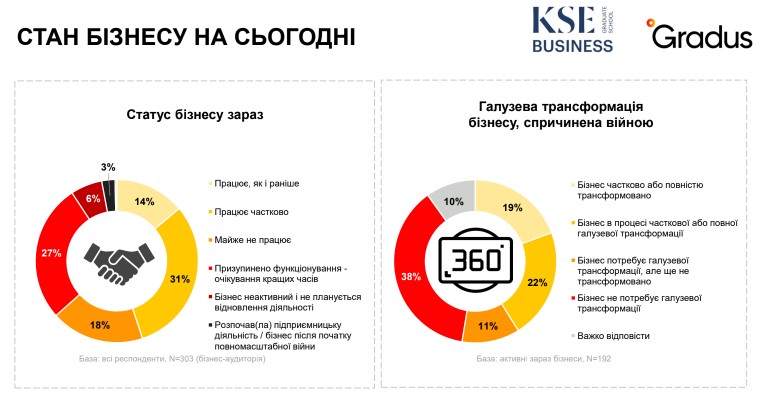The outbreak of the war was a great shock for Ukrainian business. Many enterprises vital to the Ukrainian economy were forced to close completely, while others shifted their production and offices to the safer western regions of the country or abroad.
In addition to forced relocation, many businesses faced the question of whether to convert their enterprises to wartime needs or to continue to do what they were originally created for. Let’s examine the risks involved in changing the direction of Ukrainian business in wartime and how the desire to help in the country’s defense can harm it.
Zoning of Ukrainian business and logistics
In remarks delivered during a news broadcast, Alexander Kornienko, First Vice Speaker of Ukraine’s Parliament, the Verkhovna Rada, said that Ukraine is considering options for zoning the economy by region in order to close a number of gaps in the country’s industry and logistics. There is a bill under consideration in the Rada which will geographically delineate Ukrainian business into 3 zones:
- Rear zones.
- frontal zones.
- War zones and temporarily occupied territories.
Each of the zones will have its own tax collections, as well as different regulatory mechanisms and business incentives. This model will help to mitigate the consequences of the economic shock and downturn caused by the war.
This division will also help create new supply chains in Ukraine, especially in the frontline areas, as well as in maritime regions suffering from the Russian naval blockade. In addition, the government will facilitate the import of necessary raw materials into Ukraine and seek new markets for domestically produced goods. These new sales markets will require Ukraine to organize new logistics networks.
A special burden in creating new transport routes fell primarily on postal services and food retail chains, which were forced to take steps to avoid a shortage on the shelves of their stores. This is exactly what the Auchan trading network did, which, from the moment the war began, began to carry out measures to procure and/or replace goods that, due to the outbreak of war, had become impossible to produce or purchase in Ukraine. As a result of an agreement concluded by Ukrainian Auchan with its European partners, products from Poland, Romania, the Czech Republic and Hungary appeared on the shelves of Ukrainian supermarkets.

Other food chains have also found new ways to partner with civilian carriers. The grocery retailer Silpo was able to work with the national railway company Ukrzaliznytsia to ensure deliveries to stores in front-line cities. Thanks to this cooperation, both companies were able to achieve success not only in the supply of food to the Silpo grocery store chain, but also to ensure the delivery and distribution of humanitarian aid coming to Ukraine from a number of Western allied countries.
The main private parcel service of the country, Nova Poshta, quickly reformatted its business to wartime conditions. In many ways, the company’s eight years of experience in doing business in front-line areas in the east of the country (the so-called JFO zone) proved highly valuable. That is why, at the beginning of the full-scale invasion, Nova Poshta already had its own strategy of action, primarily involving the transition to daily operational management of transport logistics.
It is worth noting that while this operational shift for retail enterprises was a forced measure, these enterprises did not fundamentally transform their industry of business. However, statistics show that more than half of businesses in Ukraine are in need of such a re-profiling. But how much is it really necessary?
Dangers of Industry Transformation
According to an investigation by the Gradus Research Company, 37% of Ukrainian enterprises currently believe that their business does need industry transformation. These numbers may seem catastrophic, but today they are much lower than during the first phase of the full-scale Russian invasion. With each day that the situation at the front stabilizes, the share of enterprises declining to radically reformat their business is only increasing. This clearly indicates a positive trend for the Ukrainian economy as a whole, as more and more Ukrainian businesses see themselves as getting back to business as somewhat usual.

Those enterprises whose new sphere of operations are strongly connected to their previous activities can afford to transform their business according to the industry needs. A good example can be found in Ukrainian heavy metallurgy enterprises like Interpipe, ArcelorMittal Kryvyi Rih, Keramet and Ukrzaliznytsia. During wartime, these enterprises have converted a number of their production facilities to producing anti-tank hedgehogs. At the same time, the Steel Profile Plant (ZSP) located in Dnipro has begun producing potbelly stoves to be delivered to the front for soldiers’ field kitchens. But how appropriate is this sort of transformation for other sectors of the economy?
Obviously, business reorientation will only benefit those players which will receive a net benefit from doing so. Some narrow-profile enterprises will simply not be able to get the necessary benefits from transforming their field of business, as a sharp reformatting of their production facilities risks significant losses and loss of profitability.
One may think that business owners should think more about providing for wartime needs above their own business interests. But the economic aspect of these decisions plays a key role in the war and is directly capable of providing Ukraine with an advantage in this conflict. In a tactical sense, any war is a struggle of battalion tactical groups (or, more simply, soldiers) fighting on the front line, while in a strategic sense, it is a struggle of the economies of the warring powers. And the strength of those who fight on the battlefield is highly dependent on the strength of the economy which is arming, feeding, and equipping them.
Mistakes
The Ukrainian government should also seriously consider how to correct a number of hastily made and not fully-thought-out decisions from the very beginning of the war. First on the list is the exemption from Value Added Tax (VAT) for importing countries, while for Ukrainian exporters of products and food, VAT refunds have been temporarily suspended.
“This puts domestic producers in an extremely disadvantageous situation compared to foreign ones and contributes to an imbalance in the state budget. Therefore, the country’s leadership must take measures to solve this problem and create a regime to promote national production,” says economist Oleh Hetman, coordinator of expert groups at the Economic Expert Platform.
The focus of Ukrainian authorities’ efforts on attracting foreign assistance may have a negative impact on the Ukrainian economy and production in the long term. Of course, at this stage of the war, Ukraine simply cannot do without allied assistance (the total monthly income from which is estimated at about $5 billion). However, the organization of a more competent economic policy in this matter could reduce the state’s debt burden by almost half, the economist believes.
The money saved could be directed to the development of our own production, including the defense industry, which is vital for today’s Ukraine. If such a policy had been pursued earlier, the country would have been able to significantly reduce its dependence on American lend-lease, ensuring that the Ukrainian Armed Forces had advanced types of domestically produced weapons at the beginning of the conflict.
Restarting Ukraine’s electronic registers, in particular the register of tax invoices, which is currently disabled even in relatively safe areas of the country, will also be extremely important in the future work on rectifying mistakes. The fact that these services are not functioning is depriving many enterprises of their access to tax credits, which is causing them to suffer heavy losses and even forcing some of them out of business, says Ilya Neskhodovsky, director of the Institute for Social and Economic Transformation.
Neskhodovsky argues that the Ukrainian state also needs to solve the problem of millions of internally displaced persons as soon as possible, as they need to provide jobs. At the same time, it is important not so much to provide people with work as to guarantee enterprises a simplified system of costs for keeping them running. In particular, this can be achieved by reducing individual income taxes, so that employers don’t face undue burdens when they want to hire workers.
These and many other well-calculated steps by the Ukrainian government will help spur the growth of production in needy regions and contribute to a favorable investment climate.
Different contributions to a common cause
According to the Gradus Research Company’s study, the most popular business sectors in wartime are IT activities, retail and wholesale of non-food products, and the provision of professional services.
The breakdown is as follows:
- Retail trade in non-food products – 17%
- Educational business – 14%
- Hotel and restaurant business – 13%
- Business related to the organization of sports and entertainment events, arts and recreation – 12%
- IT business – 12 %
The main engine of the 21st century global economy is not subsidized state-owned enterprises tied to the extraction and sale of raw materials (as is the case in the Russian Federation), but technologically-developed countries capable of manufacturing sophisticated products and exporting them around the world.
Today, along with developing its IT sector, Ukraine is paying great attention to its space sector. Companies following the example of SETS and Flight Control Propulsion, which are working on creating new types of rocket engines and fuels, have the potential to turn Ukraine from a permanent debtor state into an advanced scientific and technical hub of Europe and the world. The shoehorning of such enterprises into wartime mobilization paradigms could be disastrous for the Ukrainian economy and would only contribute to its further stagnation.
For today’s Ukraine, it is vital to stimulate the development of innovative and technological businesses that will contribute to the cultivation of new minds, and create the proper conditions in which they can realize their potential.





